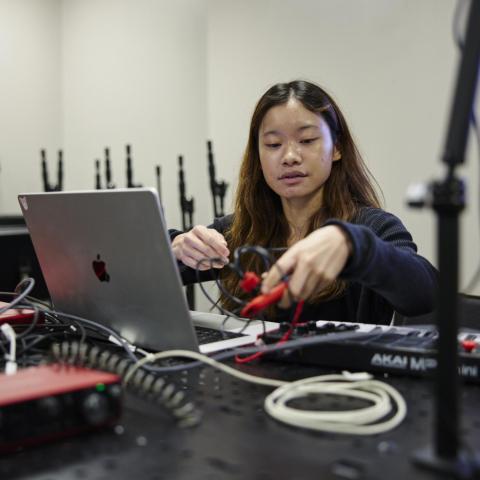Sherry Li Teaches Students How to Write Songs for Chinese Audiences

Assistant Professor Sherry Li helps her students bridge Western and Chinese cultures.
Image by John Huet
Although Assistant Professor Sherry Li joined the Songwriting Department in 2022, she has already had a transformative effect on international students and faculty members alike. Born in China, Li emigrated with her parents to Montreal, Canada, when she was in elementary school. Consequently, she is fluent in Mandarin, French, and English. Her understanding of Chinese culture has enabled her to narrow cultural gaps for the Chinese students in her classes and in other departments. Berklee currently has more than 1,200 students from China, making them the largest cohort among the international student population.
“The moment I stepped into my department, I got many questions [from colleagues] about the challenges Chinese students face in communicating and attempting to write English lyrics,” says Li. “So I’ve been giving presentations about the Chinese education system and music market at department meetings to explain the cultural and musical differences. One example is that Chinese students won’t raise their hands to ask a question in class—even when the teacher asks if there are any questions. They would rather speak with the teacher individually afterwards.” Li often advises faculty colleagues from other departments and has spoken at the Berklee Teachers on Teaching development sessions.
“She’s pointing out some issues that will help us make sure that students planning to return to their home countries will have a better idea of how to use the tool set they got here at Berklee."
—
For non-native speakers, writing songs in English is a formidable challenge. Songwriters take poetic license with language and employ familiar metaphors, symbols, and double entendres. This presents a steep learning curve for those arriving in a new country and speaking a new language. Many international students, however, plan to enter the marketplace in their home country after graduating. Both Li and Rodney Alejandro, chair of the Songwriting Department, could see that they needed to help these students understand how to apply what they learned at Berklee back home. They came up with an idea to begin tackling the problem. The first step was to make songwriting courses more useful for Chinese students.
“Sherry and I worked together to develop a course called Songwriting in Mandarin,” says Alejandro. “She took the skills she learned when she was a student, combined them with what our department is teaching, and made adaptations for students planning to return to work in China.” Li adds that learning how to write in Mandarin is essential for those who want to enter the Chinese market as artists or songwriters. “Before this class, they had nowhere to sharpen their Chinese lyricism,” she says.
Sherry Li at TEDx Youth at Granville Island in June 2021
Li brings broad experience to the courses she teaches in music production and topline songwriting. She honed her studio skills earning her Berklee degree as an electronic production and design major, after having experienced early success as a songwriter. As a teen living in Canada, the ambitious Li had built a following back in China, gaining widespread notice for her songwriting. “I started making music when I was 15,” she recalls, “and began blogging about my efforts to become a professional musician. At the time, a career in music was a highly unusual route to take, and I captured the interest of many Chinese netizens.”
At 17, Li was invited to fly to China to participate in an event with top Chinese music industry professionals. There she met the A&R representative for singer LuHan—then the Chinese analogue to Justin Bieber. Impressed with Li’s songs, the rep invited her to pitch material for the artist’s upcoming album. LuHan cut one of Li’s songs, which became a single that was picked up by Disney for the Chinese promotional campaign for the movie Kung Fu Panda 3.
In 2018, the year Li graduated from Berklee, she founded a production company with Yao Wang, now an assistant professor in the Screen Scoring Department. “We were both passionate about the intersection of art and new technology,” Li says. “We formed ICTUS Audio to explore music’s many possibilities in new mediums such as virtual reality, interactive experiences, and immersive installations.”
The Vancouver, Canada–based company, which employs 11 people, also has a commercial music service. Li says this service started after a Berklee classmate connected her with a talented filmmaker whom she began collaborating with. “Our artistic works caught the eyes of major brands and production houses, which kick-started our commercial scoring services,” she explains. What started out as artistic exploration grew to the point where Li now works on campaigns for major clients such as Mercedes Benz, Porsche, Vogue, and others.
Li enjoys sharing her experiences in the music industry with those in her classroom. “I love teaching,” she adds, “and whenever I can, I bring in students to work on my industry projects. I’ve been able to connect those with completed works to A&R people. Some students are selling their songs, which makes me very happy.”

ICTUS Audio also hosts an online music academy that teaches jazz harmony, improvisation, and songwriting directed toward Chinese high school students. “These resources are not available in the cities where some of these students live,” Li says. “Classical music training is abundant in China, but creative, contemporary music instruction, not so much. We help the students get ready for their Berklee auditions, and about 40 of them have come here.”
Li says that she feels she owes a debt of gratitude to Berklee because it’s where she developed her skills, made contacts, and began her career.
Alejandro has a clear vision of how Li can give back to the college as a whole. “Sherry will be part of a panel for a faculty development group that is addressing the needs of all of Berklee’s international students who learned English as an additional language,” he says. “She’s pointing out some issues that will help us make sure that students planning to return to their home countries will have a better idea of how to use the tool set they got here at Berklee.”
Li’s future looks bright in both education and the industry. She’s working on growing her business, becoming a more effective educator, and helping young artists navigate the AI revolution. She says she’s looking forward to these challenges. At this point, she has fulfilled many of the dreams she had at 15. “Now I’m into the great unknown,” she says.




